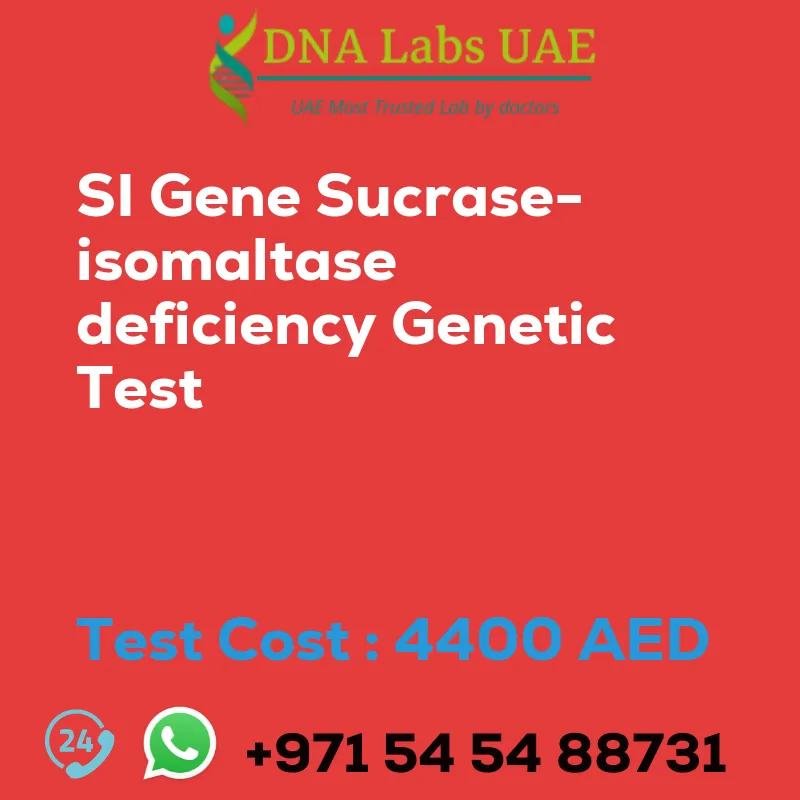SI Gene Sucrase-isomaltase deficiency Genetic Test
Test Name: SI Gene Sucrase-isomaltase deficiency Genetic Test
Components: DNA Labs UAE
Price: 4400.0 AED
Sample Condition: Blood or Extracted DNA or One drop Blood on FTA Card
Report Delivery: 3 to 4 Weeks
Method: NGS Technology
Test Type: Metabolic Disorders
Doctor: General Physician
Test Department: Genetics
Pre Test Information
Clinical History of Patient who is going for SI Gene Sucrase-isomaltase deficiency NGS Genetic DNA Test
A Genetic Counselling session to draw a pedigree chart of family members affected with Sucrase-isomaltase deficiency
Test Details
SI Gene Sucrase-isomaltase deficiency (GSID) is a rare genetic disorder that affects the digestion of certain sugars, specifically sucrose and isomaltose. This condition is caused by mutations in the SI gene, which provides instructions for producing the sucrase-isomaltase enzyme.
NGS (Next-Generation Sequencing) Genetic Test is a type of genetic testing that uses advanced sequencing technologies to analyze multiple genes simultaneously. In the case of GSID, an NGS genetic test can be performed to identify mutations in the SI gene. This test can help confirm the diagnosis of GSID and provide information about the specific genetic variants causing the condition.
The NGS genetic test for SI Gene Sucrase-isomaltase deficiency typically involves obtaining a DNA sample, usually through a blood sample or cheek swab. The DNA is then sequenced using NGS technology to analyze the SI gene for any mutations or variants. The results of the test can help healthcare professionals understand the underlying genetic cause of GSID in an individual.
This genetic test can be useful in diagnosing GSID, especially in cases where the symptoms are not clear or when other diagnostic methods have been inconclusive. It can also provide valuable information for genetic counseling, as it can help determine the likelihood of passing on the condition to future generations.
It is important to note that genetic testing for GSID should be conducted under the guidance of a healthcare professional or genetic counselor who can provide appropriate counseling and support.
| Test Name | SI Gene Sucrase-isomaltase deficiency Genetic Test |
|---|---|
| Components | |
| Price | 4400.0 AED |
| Sample Condition | Blood or Extracted DNA or One drop Blood on FTA Card |
| Report Delivery | 3 to 4 Weeks |
| Method | NGS Technology |
| Test type | Metabolic Disorders |
| Doctor | General Physician |
| Test Department: | Genetics |
| Pre Test Information | Clinical History of Patient who is going for SI Gene Sucrase-isomaltase deficiency NGS Genetic DNA Test A Genetic Counselling session to draw a pedigree chart of family members affected with Sucrase-isomaltase deficiency |
| Test Details |
SI Gene Sucrase-isomaltase deficiency (GSID) is a rare genetic disorder that affects the digestion of certain sugars, specifically sucrose and isomaltose. This condition is caused by mutations in the SI gene, which provides instructions for producing the sucrase-isomaltase enzyme. NGS (Next-Generation Sequencing) Genetic Test is a type of genetic testing that uses advanced sequencing technologies to analyze multiple genes simultaneously. In the case of GSID, an NGS genetic test can be performed to identify mutations in the SI gene. This test can help confirm the diagnosis of GSID and provide information about the specific genetic variants causing the condition. The NGS genetic test for SI Gene Sucrase-isomaltase deficiency typically involves obtaining a DNA sample, usually through a blood sample or cheek swab. The DNA is then sequenced using NGS technology to analyze the SI gene for any mutations or variants. The results of the test can help healthcare professionals understand the underlying genetic cause of GSID in an individual. This genetic test can be useful in diagnosing GSID, especially in cases where the symptoms are not clear or when other diagnostic methods have been inconclusive. It can also provide valuable information for genetic counseling, as it can help determine the likelihood of passing on the condition to future generations. It is important to note that genetic testing for GSID should be conducted under the guidance of a healthcare professional or genetic counselor who can provide appropriate counseling and support. |








